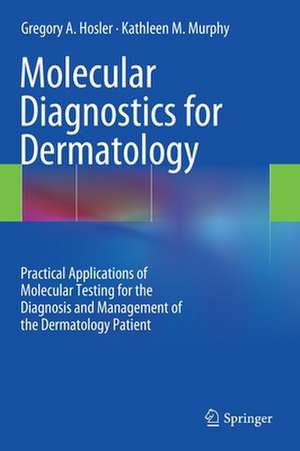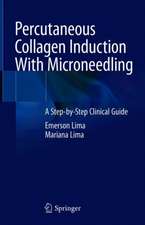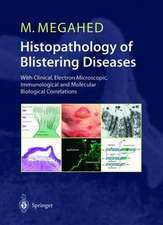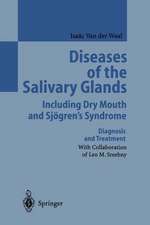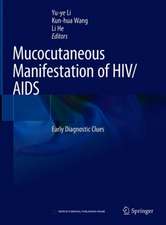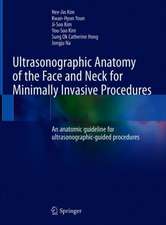Molecular Diagnostics for Dermatology: Practical Applications of Molecular Testing for the Diagnosis and Management of the Dermatology Patient
Autor Gregory A. Hosler, Kathleen M. Murphyen Limba Engleză Hardback – 21 mai 2014
| Toate formatele și edițiile | Preț | Express |
|---|---|---|
| Paperback (1) | 605.60 lei 38-45 zile | |
| Springer Berlin, Heidelberg – 22 aug 2016 | 605.60 lei 38-45 zile | |
| Hardback (1) | 863.66 lei 6-8 săpt. | |
| Springer Berlin, Heidelberg – 21 mai 2014 | 863.66 lei 6-8 săpt. |
Preț: 863.66 lei
Preț vechi: 909.11 lei
-5% Nou
Puncte Express: 1295
Preț estimativ în valută:
165.26€ • 173.16$ • 136.62£
165.26€ • 173.16$ • 136.62£
Carte tipărită la comandă
Livrare economică 11-25 aprilie
Preluare comenzi: 021 569.72.76
Specificații
ISBN-13: 9783642540653
ISBN-10: 3642540651
Pagini: 300
Ilustrații: XVIII, 356 p. 83 illus., 79 illus. in color.
Dimensiuni: 178 x 254 x 25 mm
Greutate: 0.96 kg
Ediția:2014
Editura: Springer Berlin, Heidelberg
Colecția Springer
Locul publicării:Berlin, Heidelberg, Germany
ISBN-10: 3642540651
Pagini: 300
Ilustrații: XVIII, 356 p. 83 illus., 79 illus. in color.
Dimensiuni: 178 x 254 x 25 mm
Greutate: 0.96 kg
Ediția:2014
Editura: Springer Berlin, Heidelberg
Colecția Springer
Locul publicării:Berlin, Heidelberg, Germany
Public țintă
Professional/practitionerCuprins
Introduction.- Terms and Definitions.- Basics of Molecular Biology and Nucleic Acids.- Principles of the Molecular Basis for Disease.- Molecular Testing Methods.- PCR and PCR-based Assays.- In situ Hybridization.- FISH and Cytogenetics.- Comparative Genomic Hybridization.- Microarray Analysis .- Melanoma.- Cutaneous Lymphoma and Leukemia Cutis.- Soft Tissue tumors.- Genodermatoses.- Infectious Disease.- Viral.- Bacterial and Mycobacterial.- Fungi and Parasites.- Emerging Molecular Applications in Dermatology.- Pharmacogenetics/Pharmacogenomics.- Theranostics.
Recenzii
From the book reviews:
“This is an outstanding reference that thoroughly explains dysfunctional molecular pathways causing the development of skin cancer. … The audience is dermatologists and any medical care professionals involved in treating patients with skin cancers. … This book is a gem. Every page should be studied.” (Patricia Wong, Doody’s Book Reviews, January, 2015)
“This is an outstanding reference that thoroughly explains dysfunctional molecular pathways causing the development of skin cancer. … The audience is dermatologists and any medical care professionals involved in treating patients with skin cancers. … This book is a gem. Every page should be studied.” (Patricia Wong, Doody’s Book Reviews, January, 2015)
Notă biografică
Gregory A. Hosler studied chemical and biomedical engineering at Princeton University, and graduated magna cum laude in 1993. He subsequently earned his MD and PhD from the University of Texas Southwestern Medical Center before joining the Department of Pathology at The Johns Hopkins University School of Medicine in 2001. He returned to the University of Texas Southwestern Medical Center as Clinical Assistant Professor of Pathology and Dermatology in 2006. Since then, he has also worked at ProPath as a dermatopathologist and in molecular diagnostics. Dr. Hosler is an active member of the American Society of Dermatopathology, the Texas Society of Pathologists, and the American Academy of Dermatology, among others. He serves on numerous committees and regularly runs educational sessions at the annual meetings. In addition to the above speaking engagements, he has lectured at the World Congress of Dermatology and is a regular guest faculty lecturer at the annual Scripps Clinic Malignancy Update on Melanoma conference. He is on the Board of Directors of the Texas Society of Pathology and the Governing Board of ProPath. He is an editorial board member for ISRN Pathology and an ad hoc reviewer for a number of leading journals, including the Journal of Cutaneous Pathology. Dr. Hosler is the author of numerous publications in peer-reviewed journals. He is the Dermatopathology Fellowship Director at ProPath.
Kathleen M. Murphy earned a PhD from the Department of Microbiology and Immunology at the University of Louisville in 1999 and subsequently completed postdoctoral training in Molecular Pathology at The Johns Hopkins University School of Medicine. She joined the faculty at The Johns Hopkins University School of Medicine in 2001, where she advanced to the rank of Associate Professor in the Departments of Pathology and Oncology. She is currently Director of Clinical Laboratory Operations at ProPath Services, Dallas, Texas and also Adjunct Associate Professor in the Department of Pathology at The Johns Hopkins University School of Medicine. Dr. Murphy has significant experience in assay design and implementation for a wide variety of molecular diagnostic applications. She has received board certification in Molecular Diagnostics from the American Board of Clinical Chemistry and has received several national awards including the American Association for Cancer Research (AACR) Young Investigator Award (1999) and the Association of Molecular Pathology (AMP) Young Investigator Award (2001). Dr. Murphy has published over 70 articles in peer-reviewed journals and is an ad hoc reviewer for a number of leading journals.
Kathleen M. Murphy earned a PhD from the Department of Microbiology and Immunology at the University of Louisville in 1999 and subsequently completed postdoctoral training in Molecular Pathology at The Johns Hopkins University School of Medicine. She joined the faculty at The Johns Hopkins University School of Medicine in 2001, where she advanced to the rank of Associate Professor in the Departments of Pathology and Oncology. She is currently Director of Clinical Laboratory Operations at ProPath Services, Dallas, Texas and also Adjunct Associate Professor in the Department of Pathology at The Johns Hopkins University School of Medicine. Dr. Murphy has significant experience in assay design and implementation for a wide variety of molecular diagnostic applications. She has received board certification in Molecular Diagnostics from the American Board of Clinical Chemistry and has received several national awards including the American Association for Cancer Research (AACR) Young Investigator Award (1999) and the Association of Molecular Pathology (AMP) Young Investigator Award (2001). Dr. Murphy has published over 70 articles in peer-reviewed journals and is an ad hoc reviewer for a number of leading journals.
Textul de pe ultima copertă
This textbook presents the current (and near-future) state of affairs of molecular testing as it pertains to the dermatology patient. It focuses on practical applications of molecular diagnostics over a cross-section of dermatologic disease, including melanoma, lymphoma, soft tissue tumors, genodermatoses, and infectious disease. It includes practical advice to those ordering molecular tests as well as to those considering performing such tests, providing a potential template for a comprehensive dermatologic molecular diagnostics test menu. Pitfalls of interpretation and algorithmic approaches to testing are included. The textbook is directed towards all readers – clinicians, pathologists, laboratorians, and other inquisitive minds – independent of their level of molecular expertise, to provoke thought or perhaps even change practice.
The context for the book is the rapid evolution of the field of molecular diagnostics, which is becoming more pervasive in all disciplines of medicine, including dermatology. This is indeed an exciting time in dermatology. Molecular testing is now incorporated into all aspects of patient management, including diagnostics (identifying and classifying disease), prognostics (predicting disease course), and theranostics (predicting response to therapy). For example, molecular tests are now used to detect germline mutations that result in genodermatoses, somatic genetic events that characterize tumors such as melanoma and sarcomas, and genetic material of otherwise undetectable infectious organisms. For melanoma and lymphoma, testing can potentially predict tumor behavior and modify patient staging. Regarding theranostics, molecular tests that identify specific mutations in proto-oncogenes, such as BRAF and others, are now used to predict which patients will respond to designer targeted therapies. Molecular theranostics has revolutionized the entire treatment paradigm for patients with advanced melanoma, replacing “excise and pray” approaches with personalized medicine.
The context for the book is the rapid evolution of the field of molecular diagnostics, which is becoming more pervasive in all disciplines of medicine, including dermatology. This is indeed an exciting time in dermatology. Molecular testing is now incorporated into all aspects of patient management, including diagnostics (identifying and classifying disease), prognostics (predicting disease course), and theranostics (predicting response to therapy). For example, molecular tests are now used to detect germline mutations that result in genodermatoses, somatic genetic events that characterize tumors such as melanoma and sarcomas, and genetic material of otherwise undetectable infectious organisms. For melanoma and lymphoma, testing can potentially predict tumor behavior and modify patient staging. Regarding theranostics, molecular tests that identify specific mutations in proto-oncogenes, such as BRAF and others, are now used to predict which patients will respond to designer targeted therapies. Molecular theranostics has revolutionized the entire treatment paradigm for patients with advanced melanoma, replacing “excise and pray” approaches with personalized medicine.
Caracteristici
Emphasis on practical applications of molecular testing in diagnosis and management
Offers insights into the interpretation of tests
Explains pitfalls and presents user-friendly algorithmic approaches
Includes bullet points highlighting key information for easy application
Offers insights into the interpretation of tests
Explains pitfalls and presents user-friendly algorithmic approaches
Includes bullet points highlighting key information for easy application
